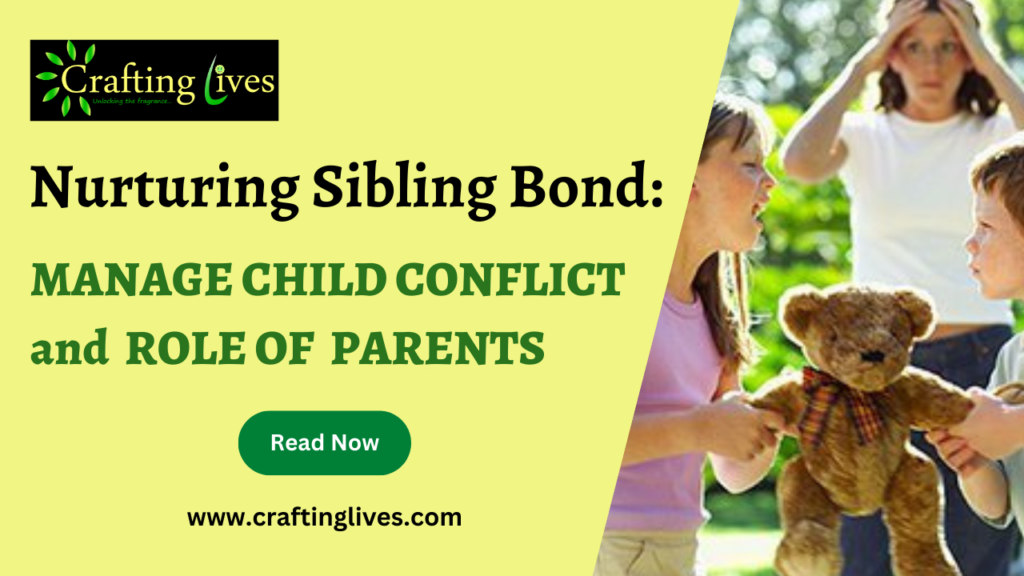
Sibling relationships are incredibly special, filled with shared memories, companionship, and lifelong support. However, sibling rivalry is a common phenomenon that can create tension and conflict within the family dynamic. In this blog, Explore the complexities of sibling relationships and discover effective strategies for managing sibling rivalry and minimizing conflict within the family dynamic. Gain insights into the reasons behind sibling rivalry and learn how parents can foster healthy sibling relationships
Understanding Sibling Rivalry:
Sibling rivalry refers to the competition, jealousy, and conflict that can occur between siblings. It is a natural and common occurrence in families with multiple children. Siblings may argue, compete for attention, resources, or parental affection, and experience feelings of resentment or jealousy towards one another.
Causes of Sibling Rivalry:
Several factors contribute to the development of sibling rivalry

- Individual Differences: Each child has a unique personality, temperaments, and needs. These differences can lead to conflicts when siblings vie for attention or feel their needs are not being met equally.
- Limited Resources: Siblings may perceive limited resources such as parental time, attention, or material possessions as scarce commodities. Competition arises when they believe that one sibling is receiving more than their fair share.
- Birth Order: Birth order can influence sibling dynamics. Older children may feel displaced by the arrival of a younger sibling, while younger children may struggle to live up to their older sibling’s achievements.
- Parental Comparisons: When parents compare siblings, whether in academics, behavior, or other aspects, it can fuel rivalry and create a sense of competition and inadequacy among children.
- Age and Developmental Stages: Siblings at different developmental stages may have different needs and abilities, leading to conflicts and feelings of inequity.
What are the signs of unhealthy sibling rivalry?
What are the signs of unhealthy sibling rivalry? Parents may want to understand the indicators of more serious or detrimental sibling rivalry to identify and address issues early on. They seek guidance on recognizing signs such as excessive aggression, constant conflicts, or negative emotional impacts on the siblings.
Signs of unhealthy sibling rivalry can manifest in various ways. Here are some indicators that parents should be aware of:
- Excessive aggression: If siblings frequently engage in physical or verbal aggression towards each other, such as hitting, kicking, pushing, or using derogatory language, it suggests a more severe form of sibling rivalry. The aggression may be disproportionate or persistent, causing harm or distress to one or both siblings.
- Constant conflicts: Siblings naturally have disagreements, but if conflicts are frequent, intense, and unresolved, it can indicate unhealthy rivalry. These conflicts may occur over trivial matters and escalate quickly, leading to a hostile and tense environment at home.
- Extreme competition: Healthy competition among siblings can be beneficial, but when it becomes intense and leads to a constant need to outdo or undermine each other, it indicates unhealthy rivalry. Siblings may feel always compelled to win or be the best, negatively impacting their self-esteem and relationship.
- Manipulation and sabotage: If one sibling consistently manipulates situations or sabotages the other’s efforts to gain an advantage, it suggests an unhealthy power dynamic. This behaviour may include lying, spreading rumours, intentionally damaging belongings, or excluding the other sibling from activities or social circles.
- Emotional distress and withdrawal: Unhealthy sibling rivalry can cause emotional distress, leading to increased anxiety, depression, or low self-esteem in one or both siblings. They may exhibit withdrawal, loss of interest in activities, or changes in behavior or mood.
- Parental triangulation: Siblings engaged in unhealthy rivalry may try to manipulate or influence parental favouritism. They may seek to gain an advantage by creating conflicts that draw parents’ attention, aiming to position themselves as the favoured child.
- Lack of empathy and respect: Unhealthy sibling rivalry often involves a lack of empathy and respect for each other’s feelings, boundaries, and possessions. Siblings may dismiss or belittle each other’s achievements, feelings, or opinions, fostering a hostile and unsupportive relationship.
It’s important to note that occasional sibling conflicts and disagreements are normal. However, when these signs become chronic, and intense, and have a negative impact on the well-being of the siblings involved, it’s crucial for parents to address and intervene to promote healthier dynamics and resolve underlying issues.
Role of Parents in Preventing Sibling Rivalry:

Parents play a crucial role in managing and mitigating sibling rivalry. Sibling rivalry is common in many families and can arise due to various factors such as competition for attention, jealousy, differences in personality, or conflicts over resources. Parents can play some key roles in addressing and reducing sibling rivalry.
Foster Positive Parenting Practices:
Create a warm and nurturing environment that promotes love, respect, and empathy within the family. Encourage open communication and active listening between siblings and model positive conflict resolution skills.
Equal Attention and Individual Quality Time:
Strive to spend quality one-on-one time with each child to meet their individual needs and interests. This helps children feel valued and reduces the perception of favouritism.
Avoid Comparisons:
Recognize and celebrate each child’s unique strengths and accomplishments without comparing them to their siblings. Encourage a sense of individuality and support their personal growth.
Promote Cooperation and Collaboration:
Encourage siblings to work together on shared tasks or projects, fostering a sense of teamwork and cooperation. Emphasize the value of supporting and helping each other.
Teach Problem-Solving Skills:
Teach children effective problem-solving techniques to resolve conflicts peacefully. Encourage them to express their feelings, listen to each other’s perspectives, and find mutually beneficial solutions.
Set Clear Boundaries and Expectations:
Establish clear rules and expectations for behaviour, responsibilities, and the use of shared resources. Consistency in discipline helps create a sense of fairness and reduces opportunities for rivalry.
Encourage Sibling Bonding:
Facilitate opportunities for siblings to bond and engage in activities together. Encourage shared interests and cooperative play, and encourage them to appreciate each other’s company.
Teach Empathy and Respect:
Help children develop empathy by teaching them to understand and consider each other’s feelings. Encourage respect for personal boundaries, possessions, and differences.
Model Healthy Relationships:
Serve as a positive role model by demonstrating healthy communication, conflict resolution, and cooperation within your own relationships. Children learn a great deal by observing their parents’ behavior.
Strategies for Parents that can help
Addressing perceived favouritism and ensuring that each child feels loved and valued requires a thoughtful and sensitive approach. Here are some strategies that helps gain valuable insights into managing sibling rivalry and fostering healthy sibling relationships. Discover effective strategies for minimizing conflict and promoting harmony within the family dynamic
Reflect on your parenting style:
Consider whether your actions or behaviours unintentionally contribute to the perception of favoritism. Reflect on how you distribute your time, attention, and resources among your children. Strive for fairness and consistency in your interactions with each child.
For instance, in many families, the birth of a younger one takes away all attention from the elder sibling. He has to constantly hear, ‘Be careful, don’t touch baby’, ‘give this toy to little one; you are the big brother’, and so on. Though the parents do this unintentionally, it gives the child a sense of ‘favouritism’.
Spend quality one-on-one time:
Dedicate individual time with each child to engage in activities they enjoy. This special time allows you to connect with each child on a deeper level, understand their needs, and communicate your love and support. Ensure that you rotate and balance this one-on-one time between all your children.
An example could be to plan a movie date with your elder child, so that he gets to spend some quality time.
Celebrate individual strengths and accomplishments: Recognize and appreciate each child’s unique qualities, talents, and achievements. Avoid comparing your children, as this can fuel jealousy and resentment. Encourage their individual pursuits and provide opportunities for them to shine in their own areas of interest.
Its seen in most parent counselling sessions that they will compare the skills of their kids. For instance my younger ones plays keyboard like a pro but the elder one is too distracted. We fail to understand that everyone is born with unique abilities and challenges, and we need to work on that rather than making unhealthy comparisons.
Treat each child as an individual: Avoid labelling or categorizing your children based on their birth order or other external factors. Recognize and respect their individual personalities, preferences, and needs. Tailor your parenting approach to meet each child’s specific requirements and foster a sense of individuality.
Encourage open communication: Create a safe and open space for your children to express their feelings, including any concerns about favouritism. Please encourage them to share their emotions and experiences without judgment. Active listening and validating their feelings can help alleviate any resentment or jealousy they may be feeling.
It is important to listen to your child, they may have some hidden, unexpressed feelings for their siblings or for you. For example, an elder brother has a treasured collection of ‘pokemon’ cards. One day, his younger sister comes and throws tantrums for the cards, and you intervene and let her have them. Now the elder one is left sulking and unheard. If open communication is initiated with both siblings, many good habits will automatically become a part of their personalities as they grow up.
Be fair and transparent: When making decisions or distributing resources, be fair and transparent about your reasoning. Explain your choices and ensure that each child understands the rationale behind them. Encourage them to participate in decision-making processes when appropriate, fostering a sense of inclusivity and fairness.
Children usually complain that they had to read from their sibling’s books or get his uniform or some clothes as they were younger. From a child’s perspective, there is nothing wrong in thinking like this. However, by acknowledging their feelings and explaining the broader benefit of reusing items, parents can offer alternatives such as new story books or a fresh school bag, ultimately helping to resolve the issue.
Seek opportunities for shared experiences: Create opportunities for your children to engage in activities together. Encourage cooperation, teamwork, and collaboration. Engaging in shared experiences can help strengthen their bond, foster empathy, and reduce feelings of rivalry or favouritism.
Seek professional support if needed: If the feelings of neglect or favouritism persist or become problematic, consider seeking the guidance of a family therapist or counsellor. They can provide insights and strategies tailored to your family’s specific dynamics and help facilitate healthy communication and understanding.
Remember, addressing perceived favouritism requires consistent effort and open dialogue. By actively nurturing each child’s unique qualities, providing individual attention, and promoting fairness, you can create an environment where they feel loved, valued, and appreciated for who they are.
Conclusion:
Sibling rivalry can be managed and mitigated with the active involvement of parents. By setting a positive example, encouraging individuality, promoting cooperation, establishing clear rules, fostering communication and empathy, parents create an environment that nurtures sibling bonds and minimizes conflicts. Remember, each family is unique, and different strategies may work better for different situations. With patience, understanding, and a commitment to positive parenting, we can foster strong and loving relationships among our children, creating a harmonious and joyful family dynamic.
Crafting Lives is among the Best Child Therapy Centre in Indirapuram, Ghaziabad. We have multidisciplinary experts and the best standardized clinical approach for the child with special needs and developmental delays. we provide one-on-one therapies related to autism, child Behavior Therapy and special education in the Indirapuram centre. To know more, visit https://craftinglives.com/special-needs

What an insightful article! Please do post more articles, and I look forward to it, thanks